Small Business Ad Rewards
A brand new rewards program for small businesses advertising on Facebook.
My role
Content Designer
team
Product designer
Product manager
Data scientist
Engineers
timeline
12+ months
(03/22 – 04/23)
Problem
Small businesses (SMBs) make up a large part of Facebook’s ad users, but they have a lot of churn. There’s not much incentive to continue advertising on Facebook, especially when it’s not the most intuitive to use.
Goal
Create a rewards program that encourages SMBs to advertise more
Business goals
Decrease user churn
Help SMBs reach AVO
Boost Meta’s ad revenue
User goals
Get free ad credits (yay)
Become more comfortable with Ads Manager
Around 4M small businesses haven’t reached a threshold of specific ad conversions (AVO, aka Advertisers with Valuable Outcomes), and are at a higher risk (50-70%) of churning.
project
ideate
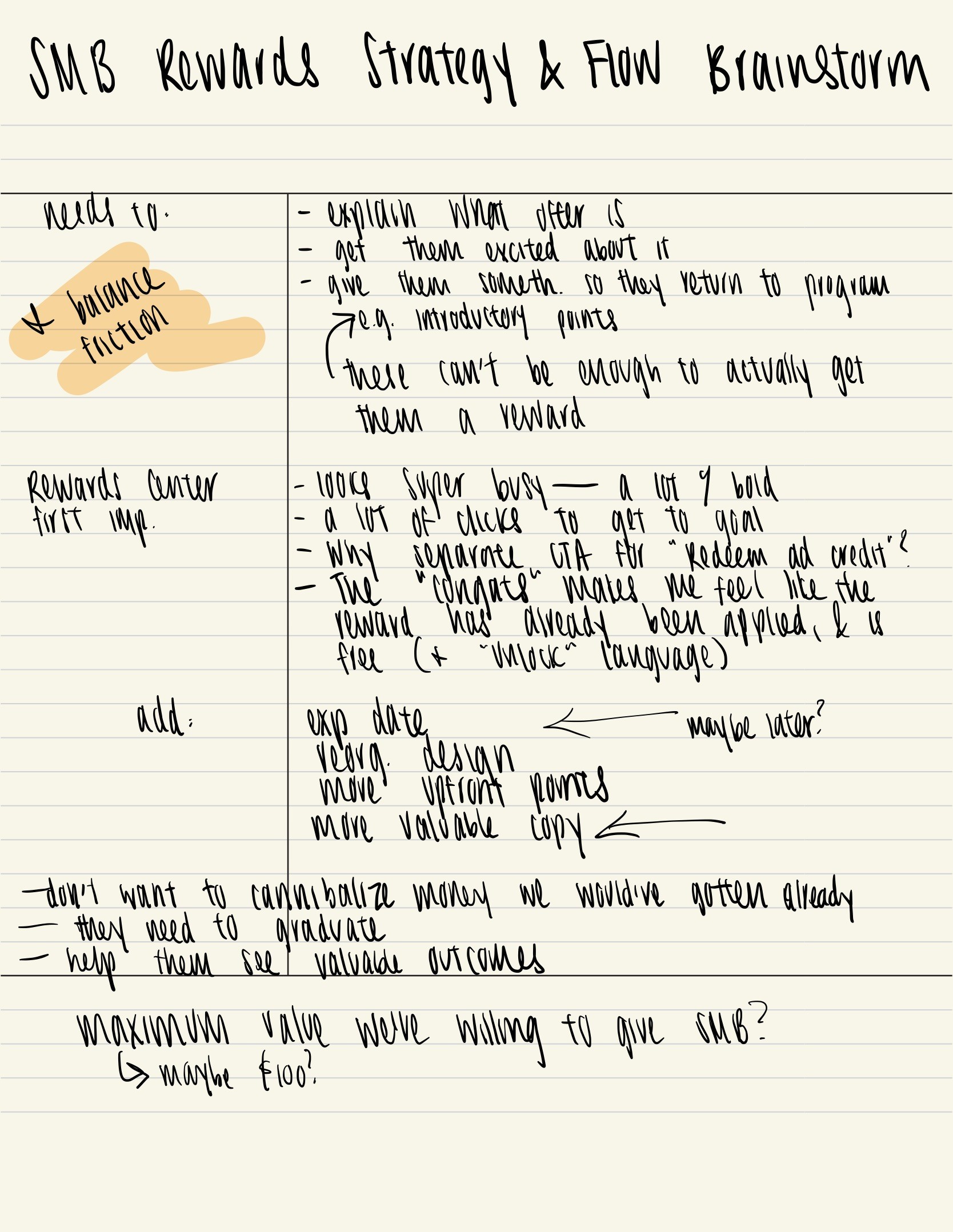
Before we started designing, we needed to think about strategy and information architecture. We came up with:
Key features of the program
$1 = 1 point
Welcome Offer (10x point multiplier)
Challenges (ways to earn extra points based on performance-driving actions identified in H1’22)
Entry points
Notification
Newsfeed
Megaphone
Key features of the dashboard
Total points accumulated
Rewards (upcoming and currently available)
Naming the feature
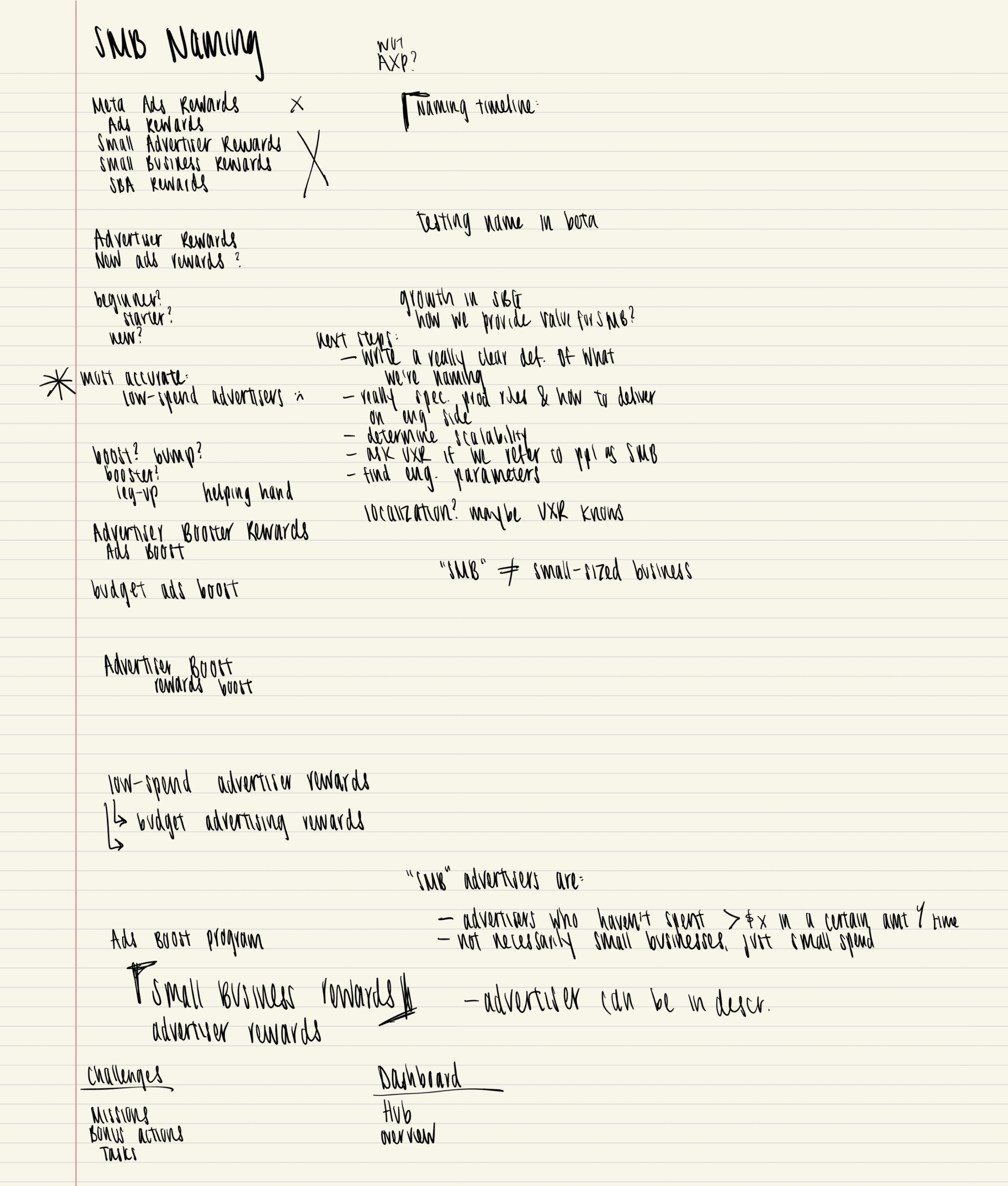
Since this was a net new program, I had to come up with a name that was intuitive, original, not too long, and preferably 3 words or less (per Brand’s recommendation).
We didn’t have a lot of leeway;
“Small Business” was a must so SMBs would know they were the intended audience,
“Rewards” was a must because it would otherwise not be clear what type of program it was, and
“Ad/Advertiser” was a must, per Brand’s input.
I conducted competitive analysis of other companies’ reward programs to gain an understanding of program names, and we were able to test a few in beta. We eventually were able to negotiate shortening “Advertiser” to “Ad,” which also helped reduce visual clutter in the designs.
design

Points progress bar
User can see points earned and a link to their points history
(Future) rewards
Cards here will show potential reward options. Locked rewards show the image at 50% opacity. Once the user unlocks the reward, the text will become a "Redeem" button.
A “how it works” tl;dr
Reminds users about the details of the rewards program, since they only see the "Intro to rewards" screen once.
FAQs
Frequently asked questions about ad credits, points, and other parts of the program
What we launched with (v0)
iterations
Feedback and iterations
01
Users weren’t signing up for the program
02
The users who did sign up rarely completed the program
03
A lot of users never went back to the program dashboard
v0 problems
Hypotheses
01
The current content wasn’t clear and/or enticing enough
02
There weren’t enough returning entry points, so users weren’t able to find their way back
We learned that on average, the Rewards program dashboard had around 2.5% daily impressions from all advertisers and a 10% clickthrough rate. This indicated that not many advertisers were returning to the dashboard after enrolling.
This screen had a ~60% drop-off rate
We thought there might be a few reasons:
Visually overwhelming—too much copy
It’s too complicated to immediately understand, which leads to users not wanting to engage
It’s not immediately clear what this is—might be an ad or a scam
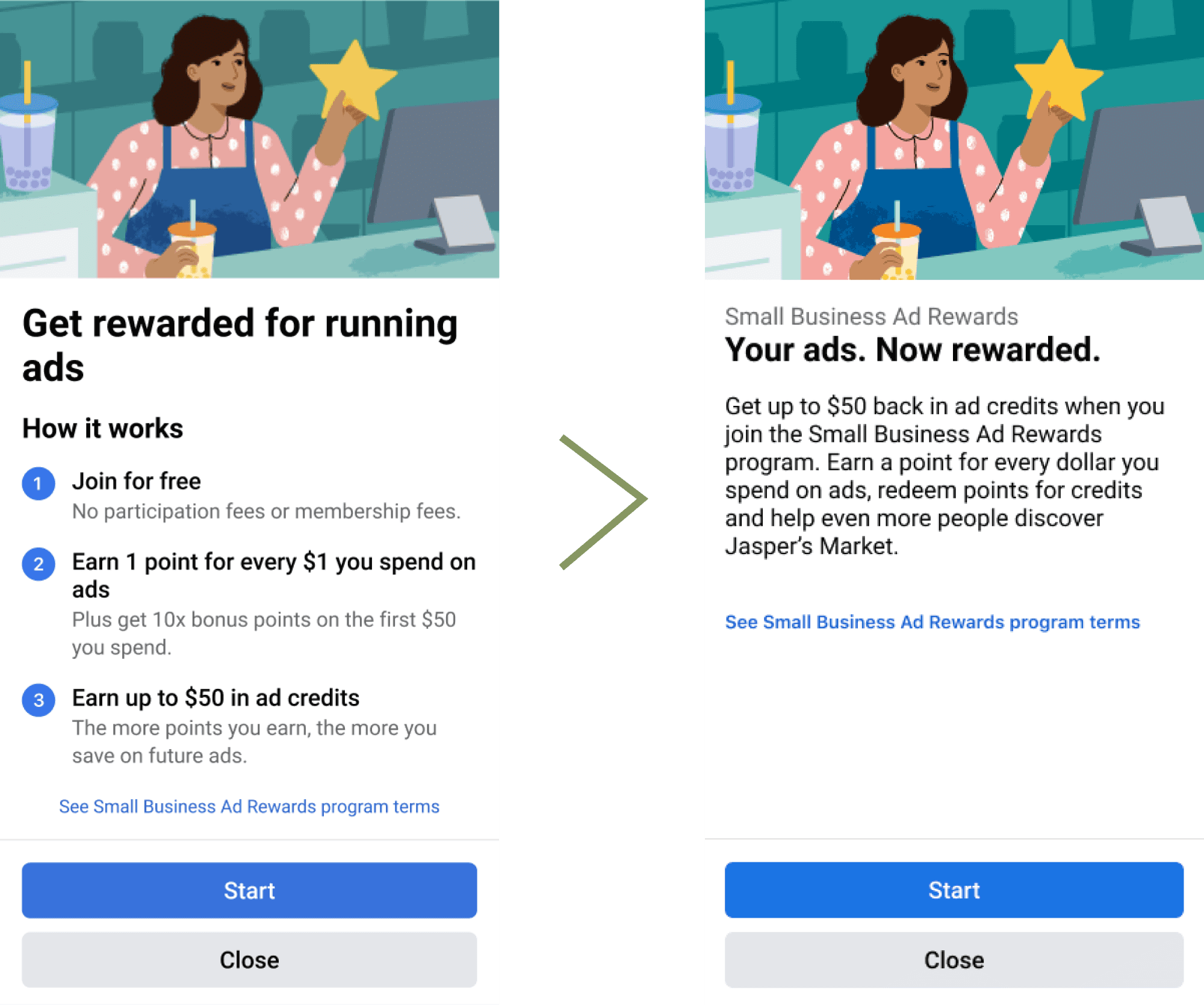
More enticing headline
A very high-level allusion to what the program entails.
Adding the program name
So users know it's not a scam.
Updating the body copy
More VP-focused. Combining the "how it works" steps into one sentence hopefully makes it less intimidating.
Introductory screen

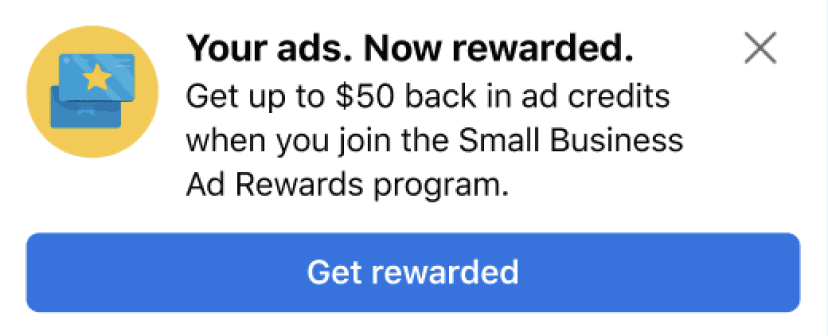
Notification
Megaphone
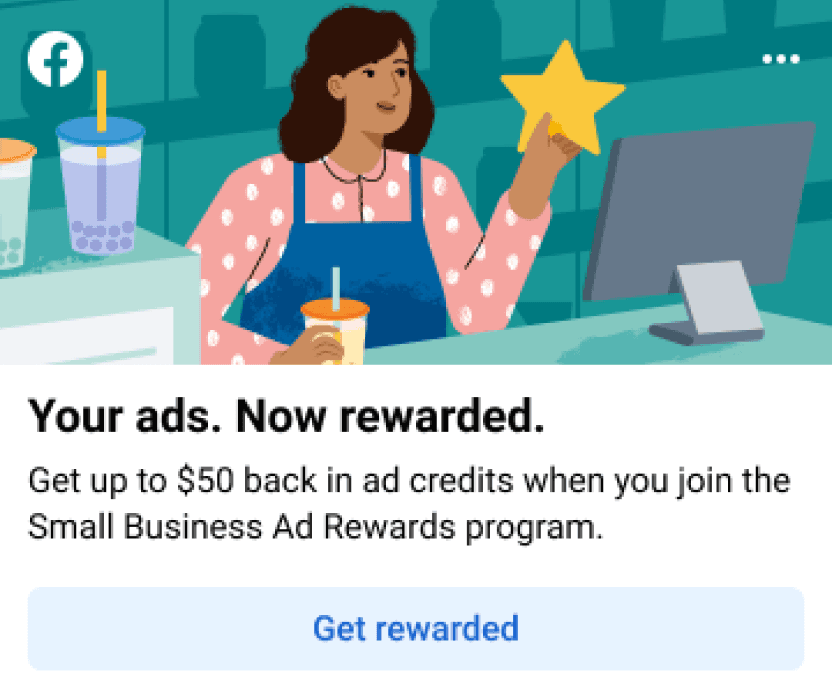
Newsfeed
New entry points
Refined messaging
Emphasized the value props of the program (getting $50 in ad credits)
Promotes the program
Reminds users that
the program exists
they can earn rewards
Interstitials
Context
Solution
Users have to go through an “Ad creation” flow in Ads Manager in order to create an ad. I wanted to test adding a new entry point/upsell to this flow, since advertisers who are actively running ads are our exact target audience.
Create two interstitial screens that would appear after the advertiser clicks on the original “Promote website” CTA
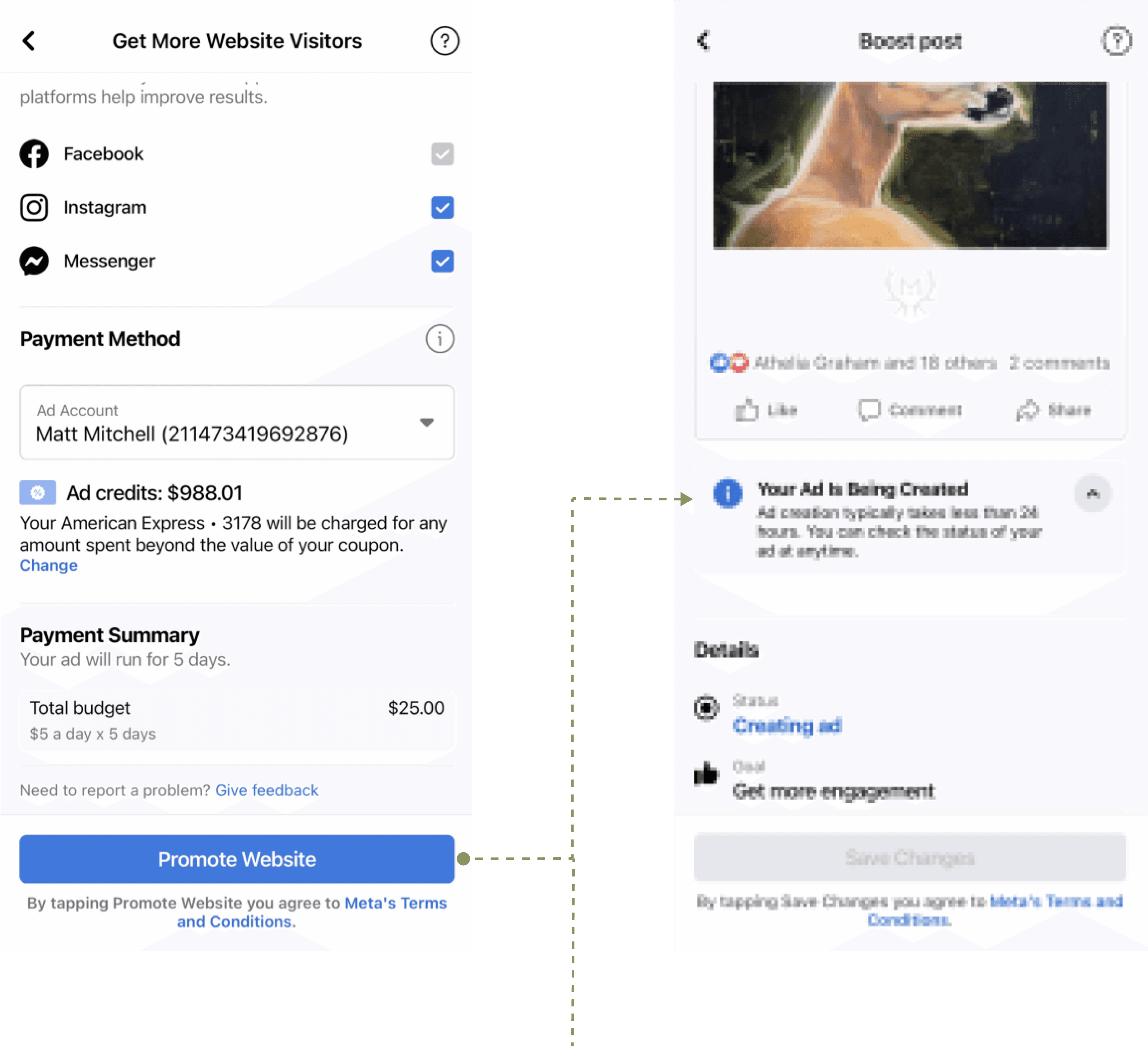
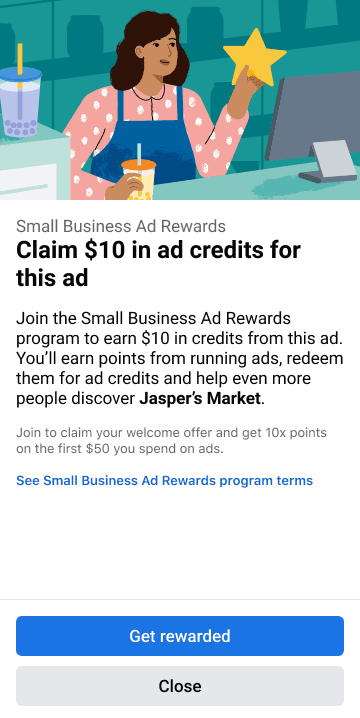
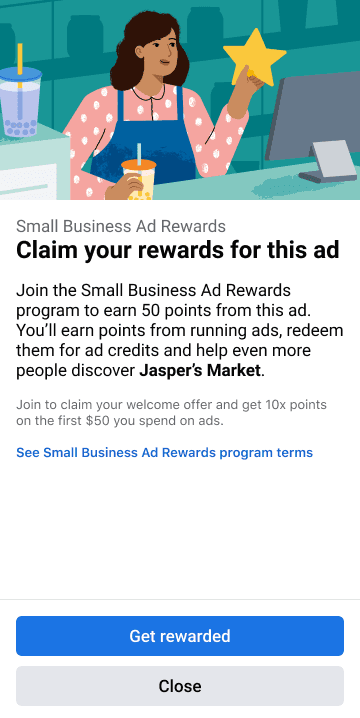
Interstitial ver. A
Shown when users just ran an ad that would’ve earned them enough points to immediately redeem a $10 ad credit
Interstitial ver. B
Shown when the spend for the most recent ad wouldn’t be enough to redeem a $10 ad credit
The original flow. Clicking “Promote website” takes you directly to the second screen.
“Challenges”
Context
Solution
“Challenges” were an opportunity for the user to earn extra points, but had low engagement. At the time, users could only access Challenges after completing the initial Welcome Offer. We knew that they were still running ads post-Welcome Offer, but weren’t enrolling in Challenges, which meant they were losing out on easy points.
Rework the logic behind Challenges and improve engagement. To do this, we:
Changed the program logic so that users could complete the Welcome Offer and Challenges at the same time
Added new entry and re-entry points
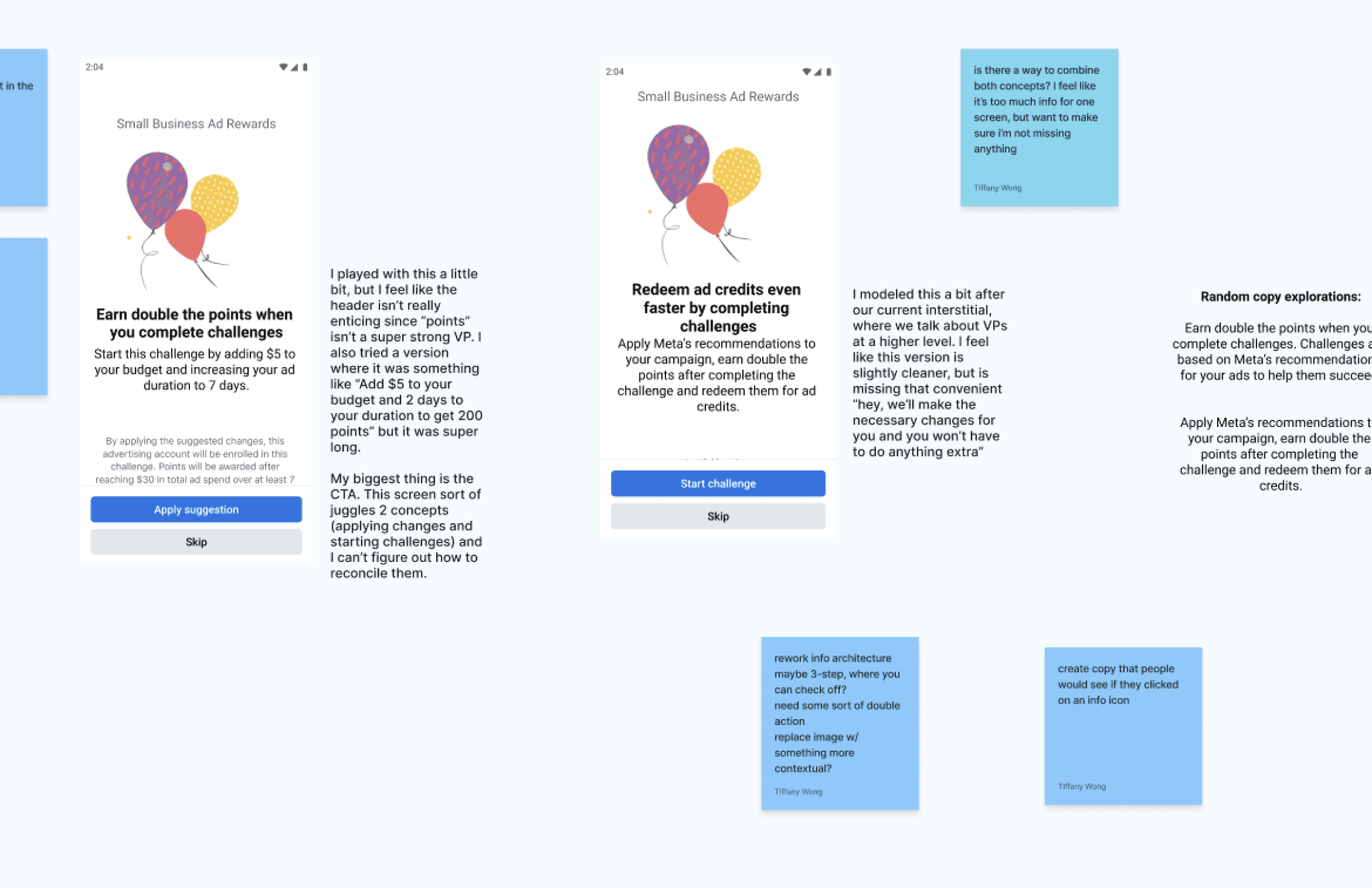
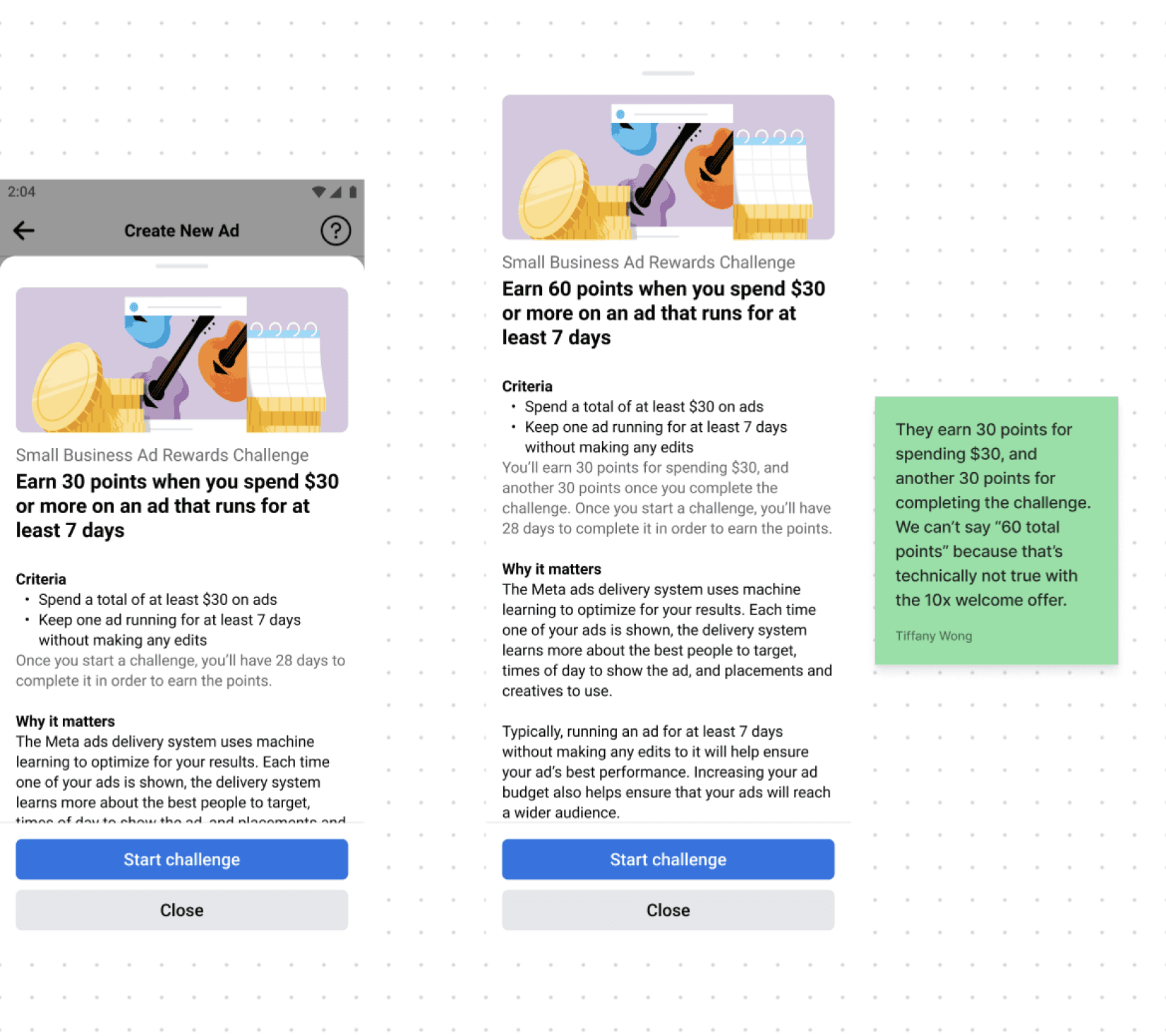
Explorations and a lot of talking to myself
Dissecting “Challenges” as a feature
To work through the logic, I broke down the rewards program into 3 key parts:
01
Users earn 1 point for every $1 spent
02
When you join the program, you get 10x points on the first $50 you spend (aka Welcome Offer)
03
Users can opt into Challenges. They get points for completing the Challenge in addition to the points they get for spending money.
Right now users have to finish the Welcome Offer (i.e. spend $50) before they can unlock and start opting into Challenges. We want to explore having Challenges being available from the beginning, meaning that there will be an overlap with the 10x points Welcome Offer. However, since the 10x points only applies to $ spent and not points earned, the math is tricky and will probably confuse users. See scenarios below for more explanation.
For these scenarios, the first Challenge is to spend $30 on an ad and run an ad for 7 days. This Challenge is worth 30 points.
scenario 1
User completes the first Challenge right after enrolling into the program. They haven’t spent money on ads other than the one from the Challenge.
The user spent $30, so they earn 30 points. With the 10x Welcome Offer, those 30 points -> 300 points. They also get an additional 30 points for completing the challenge.
Total points: 300 + 30 = 330
scenario 2
User already has 400 points. They start and complete the first Challenge.
If the user already has 400 points, that means they’ve already spent $40, so there’s $10 left in the Welcome Offer. They spend $30 on the Challenge, so the 10x multiplier applies to $10, and the regular $1 = 1 point rule applies to the other $20. They also get an additional 30 points for completing the Challenge.
Total points: ($10*10) + ($20*1) + 30 = 150
scenario 3
User starts and completes the first challenge after completing the Welcome Offer.
Users will earn 30 points for having spent $30, and then receive an additional 30 points for completing the Challenge.
Total points: ($30*1) + 30 = 60
Problems re:Challenge card design
Decisions
Ultimately, I decided on these points:
Showing the point value of just the Challenges in the headers, vs. showing point value plus points earned from spend
Not needing to explain that the 10x points Welcome Offer applies to everything, including Challenges
When describing Challenges and their point value, saying “after [action]” instead of “when [action]”. This is because the focus is solely on the points earned from the challenge, not on the points earned from spend.
01
Users will likely think that the 10x Welcome Offer applies to all points earned, not dollars spent; i.e. if they earn 60 points for a Challenge, they might expect 600 points
02
Unclear what point value to show on the Challenge cards
60 points – is this clear that it’s 30 points for spend, and 30 for completion? Will they think that the 60 points is just for completion?
30 points – is this clear that it’s just 30 points for completing the Challenge, and they’ll get another 30 for spend?
03
(Where) should there be a section in the beginning explaining that the 10x Welcome Offer will affect Challenges? Will users even care? If someone was expecting 30 points and they get 330 instead, would they be upset about it?
impact
At the time, we’d expected this program to reach 3M US advertisers/year once it became available to the general public, and 5M advertisers once it launched globally. When I left, scaled and beta testing were in progress.
Unfortunately, I don’t have specific datapoints—but I do know that the initial learnings were promising. About half of the advertisers who clicked on the entry points ended up enrolling in the program.
bay area, ca
